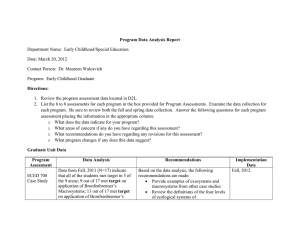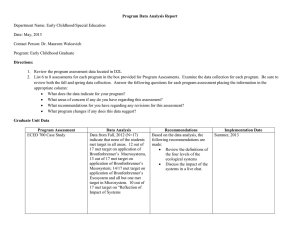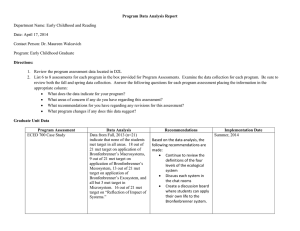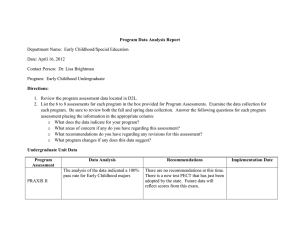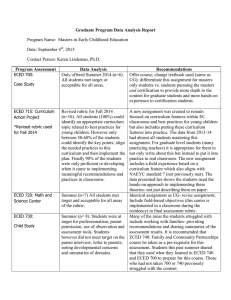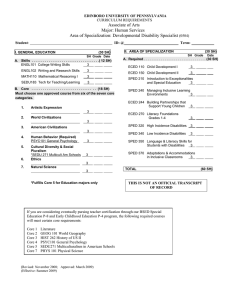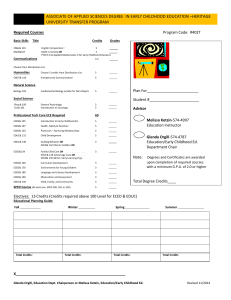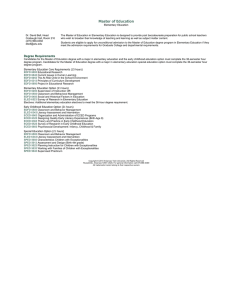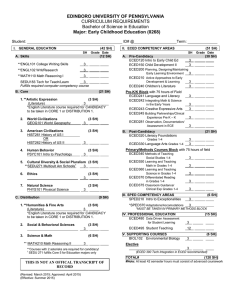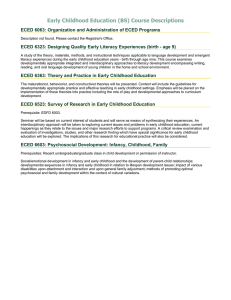Department Name: Early Childhood/Special Education Date: April 23, 2013
advertisement
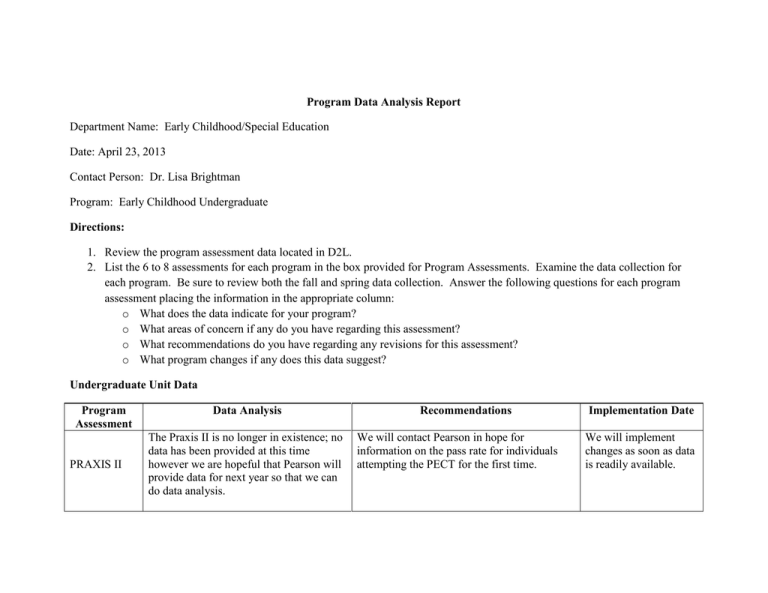
Program Data Analysis Report Department Name: Early Childhood/Special Education Date: April 23, 2013 Contact Person: Dr. Lisa Brightman Program: Early Childhood Undergraduate Directions: 1. Review the program assessment data located in D2L. 2. List the 6 to 8 assessments for each program in the box provided for Program Assessments. Examine the data collection for each program. Be sure to review both the fall and spring data collection. Answer the following questions for each program assessment placing the information in the appropriate column: o What does the data indicate for your program? o What areas of concern if any do you have regarding this assessment? o What recommendations do you have regarding any revisions for this assessment? o What program changes if any does this data suggest? Undergraduate Unit Data Program Assessment PRAXIS II Data Analysis The Praxis II is no longer in existence; no data has been provided at this time however we are hopeful that Pearson will provide data for next year so that we can do data analysis. Recommendations We will contact Pearson in hope for information on the pass rate for individuals attempting the PECT for the first time. Implementation Date We will implement changes as soon as data is readily available. ECED 150 Case Study Final Field Evaluation Form After reviewing the data from the previous year regarding the Mini Case Study: • From Spring 2012 to Fall 2012, student scores improved in all four domains. Our strongest area in this assessment project is Part I(a), and our area needing improvement is Part I(b). • We showed improvement on the recommendations that were suggested from the previous overview. After reviewing the data from the previous year: • Overall, the students did well in the core competencies in this evaluation block. • The areas in which we see needs for improvement are assessment, communication skills, and knowledge of curriculum. • The number of students meeting “target” for interactive student learning decreased significantly; we hypothesize that this could be because of the restrictions that are placed on the field candidates as part of the primary block by the Based on the data analysis, the following recommendations were made: • Add content regarding George Mead and Urie Bronfenbrenner to both ECED 120 and ECED 150 so that all students, including dualmajors, have access to content that could be covered on the PECT exam. • The self-application assignment that was originally part of ECED 110 will be moved to ECED 120. This will help us with ECED 150. • A discussion component of Urie Bronfenbrenner and George Mead will be added to both ECED 110 and 120. After carefully examining the implementation of embedded field in PreK/K and the primary block it was determined that: • The teacher candidates were not ready to do a comprehensive field experience in the first block; therefore, the PreK/K block should be viewed more as an initial field in which the teacher candidates serve as an aide in the classroom while implementing specific activities for the course work in which they are enrolled. Therefore, a checklist of competencies was developed to serve as an evaluation of these experiences. These changes will be implemented by Fall 2013. We need to continue to evaluate the data to see what trends are occurring, further data analysis is needed as this new field evolves to its terminal form. cooperating teacher who is teaching in schools. ECED 495 PDE 430 Form ECED 495 Instructional Assessment Plan After reviewing the data from the previous year regarding the PDE 430 Form completed during student teaching the analysis of the data indicated that all teacher candidates received a score of superior or higher. The state requires that all students must be satisfactory in order to become certified teachers in the state of PA. After reviewing the data from the previous year regarding the Instructional Assessment Plan, the analysis of the data suggested several areas of improvement: • Grading terminology needed to be consistent among university supervisors in their grading. It is important that all of our stakeholders are on the same page regarding how to score individuals in particular domains. • We would like to note that we have a low sample size right now, because we have made a • The primary block reflects students who have had more instruction in implementation of effective pedagogy skills; this suggests a hierarchy of application. Based on the data analysis the following recommendations were made: • A study needs to examine the scores received on the PDE 430 Form and the Instructional Assessment Plan to see how well the two assessments assess two areas; planning and preparation and instruction and delivery. • A committee will closely examine the types of assessments completed during student teaching looking for areas of inconsistency and areas for improvement. Based on the data analysis, the following recommendations were made: • A suggestion was made to complete the Teacher Candidate Performance Profile (TCPP) at the end of field. We would continue to include it in student teaching at the end of each placement. We would like to do a comparison data-analysis to compare what the university supervisor and the cooperating teacher send to PDE 430. • We recommend that we implement ways to plan based on assessment and interpretation of data. We need more Fall 2013 Fall 2013 significant program change in last year from an ELED to the ECED model. ELED 580 Case Study ELED 244 Family Literacy Bags The ELED 580 case study has been moved to a new course, ECED 381, which has been aligned with our new program. Data is currently coming in to see our areas of strength and deficiency. After reviewing the data from the previous year, for ECED 244, data analysis yielded the following results: • Students are continuing to show deficiencies on the writing component on the Literacy Bag assignment work in alignment among objectives, instruction, and assessment. This can be implemented as a part of the ECED 380 course, which is taught in conjunction with student teaching. • Under our new department structure, we plan to look specifically at the adaptations in the ECED 380 course, which is a new course. This information and strategies will be implemented now that the instructional assessment plan is part of a course. Based on the small amount of data gathered, the following recommendations were made: • More support will be provided for inference writing during class time. Sample scenarios will be incorporated into the course. • Students will have the opportunity to discuss each of the four domains (Physical-Intellectual-EmotionalSocial) as the case study has been completed. Based on the data analysis, the following recommendations were made: • A recommendation was made to analyze the placement of the Literacy Bag potential in either ECED 270 or ECED 290 • We will begin building an additional Fall 2013 Fall 2013 alternative assessment in LiveText for • All teacher candidates are showing ECED 244 100% on selection of children’s literature and character doll Teacher candidates are required to Continue to examine grades to maintain a minimum of a 3.0 GPA in ensure that all teacher candidates Grades order to graduate from the program. are prepared and knowledgeable in Grades were examined in ECED 270, the content areas specific to early 290, 340, 341, 342, 343, 350, 360, and childhood curriculum 370 as these courses deal with content knowledge specific to language arts, math science, social studies and fine arts. After reviewing the data from the previous year it is apparent that our teacher candidates are obtaining the content knowledge needed to be successful in clinical experiences. • The majority of the teacher candidates (75% or better) received a grade of B or better in all the courses examined • Fewer students received a grade lower than a B in Fall 12 as compared to Spring 12 After reviewing all the assessments it has become clear that professional writing and data analysis should continue to be the main focus for next year. The data analysis indicated that teacher candidates have difficulty writing critically, providing evidence to support findings and applying educational terminology in their writing. Additionally, teacher candidates continue to struggle in analyzing data collected to determine a course of action in the classroom. Several recommendations have been made based upon the course in which the assessment is assigned.
